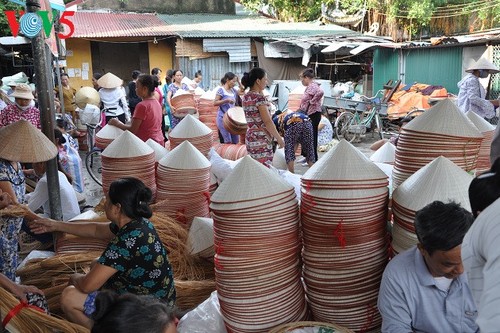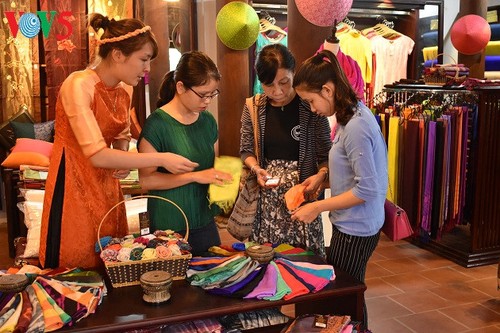 Conical hat market of Hanoi’s Chuong Village (Photo: Lan Anh) Conical hat market of Hanoi’s Chuong Village (Photo: Lan Anh) |
Vietnam has more than 5,400 craft villages spanning 50 different trade groups. Their products are exported to 160 countries and territories around the world, earning 1.7 billion USD a year.
The “One Commune, One Product” program focuses on developing one strong agricultural or non-agricultural product or service in each locality. Although the program was officially announced just this year, many localities began years ago to adopt the program’s central strategy.
Nguyen Minh Tien, head of the Central Coordination Office for the National Target Program on New-style Rural Area Building, said: “We have set a target that by the end of this year every province and city will submit an OCOP plan for approval. The Central Steering Committee has selected a few provinces and cities to pilot the program prior to expansion to all localities nationwide. This approach was successfully used in the new rural development program. We have made it as easy as possible for enterprises and households to register their products. More than 4,800 handicraft products have now qualified for the OCOP standard.”
The "One Commune One Product" program will help Vietnamese craft villages focus on one or a small number of unique local products so as to be more competitive in the world market. It’s no longer so much about simply creating gift products for local visitors as it is about developing a distinctive product and building an international brand for that product.
Luu Duy Dan, Chairman of the Vietnamese Craft Villages Association, said: “We need to organize more craft village market days which might specialize in pottery, for example, and gather pottery makers from Bat Trang, Minh Long, and Bau Truc. Regional cuisine can be introduced at the same market. It’s important to develop a culture for craft villages where heritages are created and where artisans are trained and fostered to produce unique items that can compete worldwide.”

Silk products made in Hanoi’s Van Phuc village (Photo: Lan Anh)
|
The Ministry of Agriculture and Rural Development has established centers for craft village development, offered advice on professional production methods, organized craft training courses, and supported with low-interest loans. Special attention has been given to training skilled human resources. To date, more than 30 provinces and cities have adopted the OCOP program to some extent.
Nguyen Huu Duc, leader of the OCOP team in Ha Tinh province, said: “We have sent delegations to Quang Ninh province and even to other countries to learn from their experience. We have created trademark recognition rules and regulations governing OCOP product management. Any product introduced to the market must meet quality and safety standards in order to gain consumer trust. That’s the way to develop OCOP product brands for each locality and for the nation.”
The OCOP program has created jobs for rural workers, contributed to new-style rural development, and helped to preserve the tangible and intangible cultural heritages of Vietnam’s craft villages.